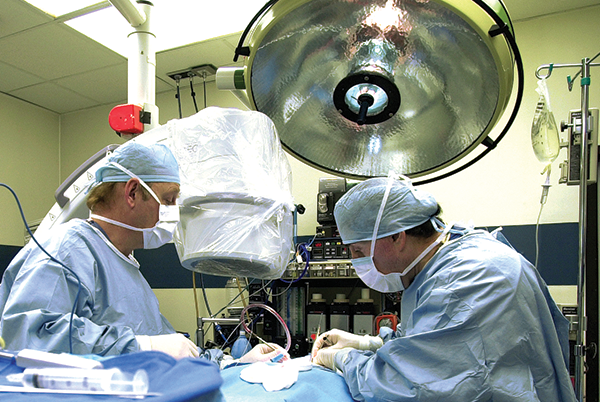Bulging Disc Surgery
Bulging Disc Surgery may be required once the symptoms caused by a bulging disc have become chronic or severe. The Bonati Spine Procedures utilize patented instruments and techniques to treat chronic pain caused by bulging discs. They can quickly and efficiently relieve the pain caused by a bulging disc by removing the pressure on the nerves. The procedures are performed on an outpatient basis, under conscious IV sedation with local anesthesia. Patients often report immediate relief as the pressure is removed. The patient is able to walk out shortly after the procedures and return to normal, pain-free life. Many of our patients return to work within days of their procedure.
A bulging disc does not mean that you will necessarily need to undergo surgery. A bulging disc bulges out of the space it should occupy but does not rupture. The disc protrusion may press abnormally on spinal nerves, the spinal nerve root, or the spinal cord, causing pain and inflammation.
Patients with a bulging disc in the lower back may complain they have sciatica. However, sciatica is not a diagnosis but a description of symptoms. The sciatic nerve starts in the lower back and runs through the buttocks and down each leg. Pressure on one or more of the lumbar nerve roots can cause pain in parts or all of the sciatic nerve.
Many people think a bulging disc is the same thing as a herniated disc, but there is a difference. With a herniated or non-contained disc, a crack occurs in the annulus, the tough outer layer of the disc. This allows the soft inner material of the nucleus pulposus to leak out of the disc. When the disc breaks down, inflammatory proteins irritate the surrounding nerves. A contained disc is a herniated disc in which the nucleus pulposus has not ruptured.
When is Bulging Disc Surgery Done
Surgery for a bulging a bulging disc is performed if the symptoms have gotten worse, or become chronic and non-surgical treatments such as anti-inflammatory medication and physical therapy have failed to relieve chronic back pain.
Chronic symptoms that may indicate surgery is needed include:
- Pain when lifting, bending, or twisting the affected area
- Pain, weakness, numbness or tingling in the extremities
- Changes in reflexes that can cause spasticity
- Changes in bladder and bowel function
- Paralysis from the waist down
Bulging Disc Surgery Options
The Bonati Spine Procedures are an array of procedures to treat a bulging disc, which may include:
Discectomy
A discectomy is performed to remove a portion of a bulging or herniated disc which is pressing on the spinal cord and/or spinal nerve roots, causing pain, radiculitis (pain that radiates to the extremities), numbness, tingling or weakness. The Bonati Discectomy is an outpatient procedure that uses subconscious IV sedation and local anesthesia so that patients are comfortable and able to provide feedback to doctors during the procedure.
Foraminotomy/Foraminectomy
A foraminotomy/foraminectomy is a surgical procedure performed to relieve nerve pressure at the site of the intervertebral foramina. The Bonati foraminotomy/foraminectomy is an outpatient procedure that uses conscious IV sedation and local anesthesia so that patients are comfortable, responsive, and able to provide feedback during the procedure. This allows the spine surgeon to target the source of your pain with pinpoint accuracy.
Laminectomy/Laminotomy
A laminectomy/laminotomy may be performed to remove nerve pressure. The Bonati laminectomy/laminotomy is performed incrementally so that the main causes of pain are addressed first. These are outpatient procedures that utilize conscious IV sedation and local anesthesia so that patients can provide feedback during the surgical procedure. This lets surgeons target the exact source of pain.
Before Surgery
Follow your surgeon’s instructions about how to prepare for your surgery. General guidelines include no food or drink after midnight the day before your surgery. If you smoke, try to quit, at least temporarily, before your surgery.
Some prescription medicine can increase your risk of bleeding and other complications during any surgical procedure. Although your physician will give you specific instructions, the following medicines should be withheld for seven days or more before surgery:
- Aspirin, Plavix, and other blood thinners
- Anti-coagulants
- NSAIDs such as Ibuprofen, Aleve, Naproxen, and Advil
- Arthritis medications
- Vitamins and herbal medicines as they may interact with the anesthesia
In addition, vitamins and herbal medicines may interact with the anesthesia. Discuss with your surgeon and physician your condition and all of your prescription medications for exact instructions on how to manage them before and after surgery.
During Surgery
All procedures are performed with conscious IV sedation and local anesthesia. Your surgeon will communicate with you during the procedure to pinpoint the exact source of your pain and facilitate its alleviation. You may be asked to complete a series of mobility exercises to ensure that the pain has been successfully treated.
After Surgery
After the surgery, you will be transferred to the post-operative care unit for observation and recovery. A post-operative consultation with your surgeon will determine your next steps. Most patients are able to begin walking therapy immediately after their procedure and can return to work and other daily activities within days.
Check out one of our patient’s stories of recovery from a bulging disc by clicking here.
Recovery Time from Bulging Disc Surgery
Because the Bonati Spine Procedures do not involve a large incision, they avoid extensive damage to the muscles surrounding the spine. This generally results in less pain after surgery and a faster recovery. The length of recovery time may vary, but most patients are walking the same day and back to everyday activities within days. Your recovery time will depend on your individual procedure and condition.
The Bonati Spine Institute has been regarded as the leader in spine surgery for over 30 years. More than 75,000 of our procedures have been performed, with a patient satisfaction rate of 98.75%.

